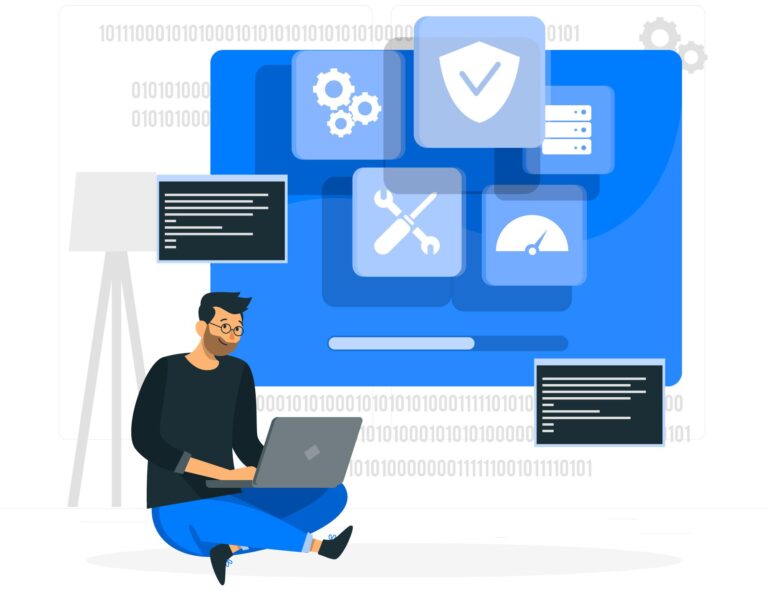In today’s tech-driven world, developing a mobile app can open up a world of opportunities. Whether you have a brilliant app idea or you’re looking to enhance your programming skills, creating your first mobile app is an exciting journey. In this comprehensive guide, we will take you through the essential steps to develop your very own mobile application.

Table of Contents
1. Why Develop a Mobile App?
- Planning Your App
2. Getting Started
- Choosing the Right Platform
- Setting Up Your Development Environment
3. Designing Your App
- User Interface (UI) Design
- User Experience (UX) Design
4. Coding Your App
- Selecting the Programming Language
- Writing Clean and Efficient Code
5. Testing and Debugging
- Importance of Testing
- Debugging Techniques
6. Launching Your App
- App Store Submission
- Marketing Strategies
7. Post-Launch and Maintenance
- Regular Updates
- User Feedback
8. FAQ
Why Develop a Mobile App?
Developing a mobile app can serve a multitude of purposes, ranging from personal projects to business ventures. Here are some compelling reasons to embark on the journey of app development:
- Business Growth: If you have a business or startup, a mobile app can be a powerful tool for reaching a wider audience, increasing customer engagement, and boosting sales. For example, a retail store might develop an e-commerce app to provide a convenient shopping experience for customers.
- Creative Expression: Mobile apps offer a creative outlet for turning your innovative ideas into tangible products. As an example, you could create a photo-editing app with unique filters and editing tools.
- Skill Enhancement: Developing an app is an excellent way to hone your coding skills. Whether you’re a beginner or an experienced developer, working on a real project can deepen your knowledge and expand your skill set.
- Solving a Problem: Apps can solve specific problems or meet particular needs. Consider developing a fitness-tracking app to help users monitor their exercise routines and health goals.
- Entertainment: Games and entertainment apps provide users with fun and engaging experiences. For instance, you might create a puzzle game that challenges players’ problem-solving abilities.
Getting Started

- Choosing the Right Platform: The choice between iOS, Android, or both platforms depends on your target audience and goals. For example, if you want to reach a global audience, developing for both platforms might be ideal. If you’re targeting tech enthusiasts, iOS could be a priority due to its affluent user base.
- Setting Up Your Development Environment: Setting up your development environment involves installing the necessary software and tools. If you opt for Android development, you’ll need Android Studio and the Android SDK. For iOS, Xcode and Swift are essential. Detailed step-by-step instructions should be followed to ensure a smooth start.
Designing Your App
- User Interface (UI) Design: Effective UI design is crucial for user engagement. Think about the layout, colour scheme, and visual elements. For example, if you’re creating a weather app, a clean and minimalist UI with intuitive icons can make data easily digestible.
- User Experience (UX) Design: UX design focuses on how users interact with your app. To illustrate, a navigation app should offer a seamless and intuitive experience, with features like turn-by-turn directions and real-time traffic updates.
Coding Your App
- Selecting the Programming Language: The choice of programming language depends on your platform. For iOS, Swift is known for its performance and readability, while Android primarily uses Kotlin. For cross-platform development, React Native and Flutter are popular options.
- Writing Clean and Efficient Code: Quality code ensures your app’s stability and future scalability. For instance, if you’re developing a social networking app, clean code practices can prevent crashes and improve overall performance.

Testing and Debugging
- Importance of Testing: Rigorous testing across various devices and scenarios is vital. In the case of a finance app, thorough testing ensures accurate calculations and secure transactions.
- Debugging Techniques: Effective debugging is essential for resolving issues promptly. If you encounter a bug in a messaging app, understanding debugging tools can help you identify and fix communication errors.
Launching Your App
- App Store Submission: When submitting your app to app stores, optimizing your listing is crucial. For example, if you’re launching a recipe app, attention-grabbing screenshots and a detailed description can entice users.
- Marketing Strategies: To gain traction, implement marketing strategies tailored to your app’s audience. If you’ve developed a meditation app, consider partnerships with wellness influencers and targeted social media campaigns.
Post-Launch and Maintenance
- Regular Updates: Keep your app fresh and relevant by regularly updating it with new features and bug fixes. For example, a news app can benefit from continuous updates to include the latest news sources and improve performance.
- User Feedback: Listen to user feedback and reviews to make informed improvements. If you’ve developed a language-learning app, user input can guide updates like new language courses and improved pronunciation guides.
Remember, app development is an ongoing journey. Stay curious, keep learning, and adapt to the ever-evolving landscape of mobile technology to ensure your app’s success.
Frequently Asked Questions (FAQs)
- Do I need coding experience to develop a mobile app?
While coding experience is beneficial, there are user-friendly app development platforms available for beginners.
- How long does it take to develop a mobile app?
The timeline varies depending on complexity. Simple apps can be developed in a few weeks, while more complex ones may take several months.
- What are the costs involved in app development?
Costs include software licenses, developer fees, and potentially hiring professionals for design and development.
- Can I develop an app by myself, or do I need a team?
You can start as a solo developer, but for complex apps, a team may be necessary.
- What is the best way to monetize my mobile app?
Monetization options include in-app ads, freemium models, and selling the app itself. Choose the one that aligns with your goals.


